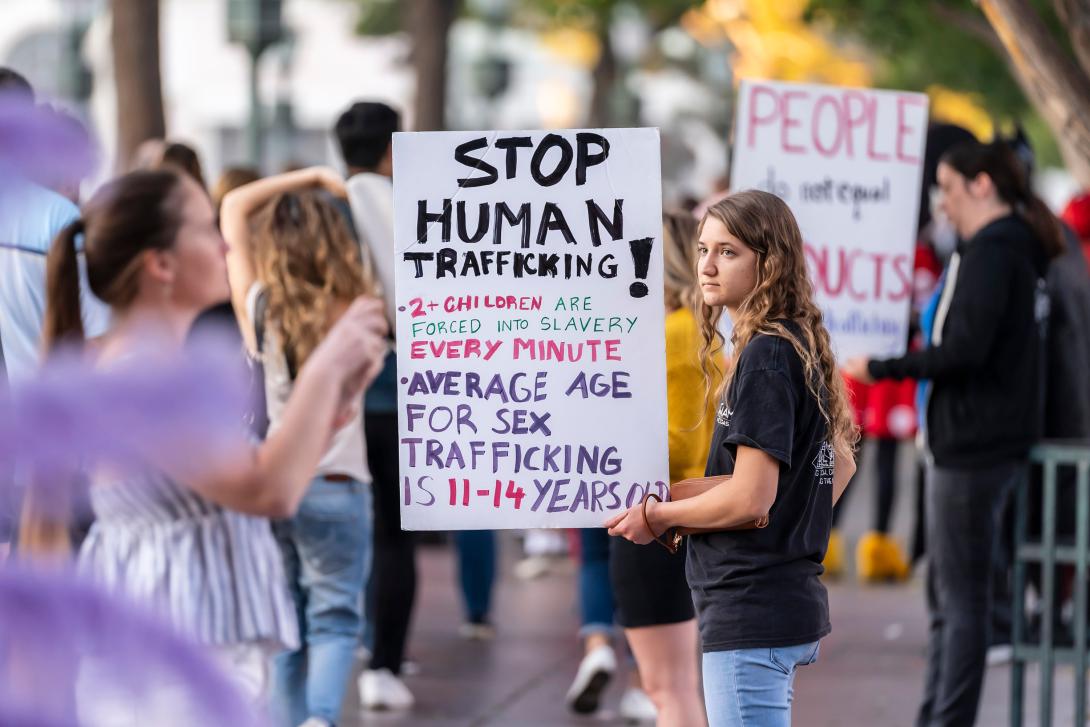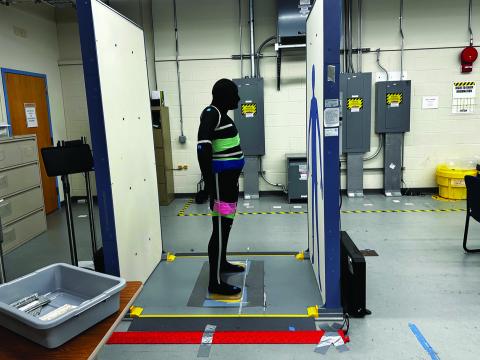Human Trafficking Is a Multibillion Dollar Industry, yet Resources for Survivors Are Lacking
On average, a human trafficking survivor attempts to leave their abuser nine times until they are successful. Upon being met with the harsh realities of criminal backgrounds and mental disorders, victims often return to their abductors simply due to the fact that it is the only life they know.
Advances in bad actor recognition and deterrence against human trafficking was a topic of discussion at AFCEA’s 2023 Homeland Security Conference.
Kicking off the conversation was Lisa Caselli, officer and program manager at the External Engagement and Initiatives Office for the U.S. Customs and Border Protection (CBP). “When people use the term alien smuggling and human trafficking, they think it’s interchangeable, but they’re very distinct differences,” Caselli began. “I use the terms fraud, force and coercion.”
Fraud, Caselli explained, is a term to describe compulsion through deception; force involves an act of physical, mental or psychological abuse; and coercion is the use of fraud and force, or threat towards a victim’s loved ones.
Cases of alien smuggling are voluntary, transportation-based, and must involve border crossing, the CBP officer went on. Human trafficking, however, is exploitation-based and involuntary.
“It’s happening in every community,” Caselli stated, debunking generalization within the topic. “It’s happening in rural communities; it’s happening here in the United States.”
The idea of victims embracing the help of law enforcement is false, she explained. “Victims and survivors are programmed and abused—emotionally and psychologically and physically—to learn not to trust law enforcement.”

Human trafficking is one of the hardest cases for investigation development, Caselli told the audience. “You have to get that trust and that cooperation with the survivor.”
While the drug trafficking industry, which receives a significant amount of public attention, is worth $34 billion worldwide, the human trafficking industry is close behind with $32 billion a year.
Echoing Caselli’s statements was fellow panelist Scott Williford, founder of The Table on Delk, a nonprofit organization that helps victims with recovery and employment upon escape.
In conversation with a friend and FBI agent, Williford recalled, the topic of progression from drug to human traffickers came up. “He told me a story of a drug trafficker that he had put away … he had been in jail for about nine years,” Williford shared. “When he came out, they re-arrested him and this time he had three minors in the back of his car.”
When Williford’s friend asked the suspect the reason for his so-called industry transition from drugs to minors, the criminal said, “Because I can reuse them over and over and over, whereas once I sell a drug, it’s gone.”
“The same people who are doing drug trafficking are now into human trafficking,” Caselli added. “And they’re using the same transportation routes.”
Victims get stuck within a cycle, Williford explained, and no community is immune to the issue.
On his drive home, for example, Williford passes three massage parlors open after 10 p.m. “I don’t know about you guys, but I don’t think much is going on that’s good at 11 or 12 o'clock at night in a massage parlor.”
Glorification of the industry is part of a much larger issue, Tim Echols, vice chairman of the Georgia Public Service Commission, added. “I wish we wouldn’t use the phrase porn star … they’re really victims of exploitative media.”
There’s promise in technology helping law enforcement capture the abusers, Echols continued.
Sexual exploitation, in many cases, can involve victims performing acts in front of a camera. “The FBI is very interested in getting those devices … they like to catch these guys by surprise with their equipment running, because they’re going to run those images through a facial recognition database to see if it’s new,” Echols explained. “A lot of stuff gets recycled, but if it’s new and they’re creating things, now it’s going to maybe help lead them to where that person is.”
Echols’ office also hosts Unholy Tours to educate legislators and the public about the realities of sex trafficking within Georgia communities. Upon watching “Amazing Grace,” a film that tells the story of British abolitionist William Wilberforce, Echols was motivated to force elected officials to “smell the stench of human trafficking and let them see something more than a PowerPoint.”
“There’s phenomenal technology out there that law enforcement is using,” he said. “that’s why we need to really continue to let our elected officials know this is important to us.”
One of Echols’ initiatives is a collaboration with utility workers, who oftentimes get an open view perspective of people’s homes. Echols and his team coordinate education on red flags which can help determine whether there is a human trafficking case taking place.
“If you see a mattress laying in a room, there’s blood on it; or there’s lots of girls in a single room,” Echols says. “We wanted to give them the opportunity, and to have corporate AGL and our cable companies to be able to say, ‘it’s okay to tell about this, you’re not violating anything.’”
Unlike the CBP, state and local police do not have broad search authority, which allow the examination and search of all persons entering the U.S.
“So, we partner with state police, the federal police, FBI and do these types of searches,” Caselli explained.
Caselli, who is a law enforcement officer and is trained to deal with criminals, asks the public “to never approach the trafficker or the victim … only because the outcome might be worse than you think.”
An immediate police presence on the scene isn’t always guaranteed upon the report of a human trafficking victim. However, that does not mean that an investigation is not taking place, Caselli explained.
“Trafficking is not like a drunk case; it’s not like a gun case; it’s not a tangible object,” she says. “Human trafficking is not like that; investigations are completely different.”
At the CBP, Caselli works with the travel and tourism industry to detect and combat human trafficking.
Unfortunately, Caselli says, big sporting events such as Super Bowl, NBA finals and Olympics increase chances of human trafficking in those areas, and call for CBP task force deployment.
“We go to the Super Bowl location about a month before the Super Bowl and we train indicators with the local police, local security personnel and whoever’s in the area on what to look out for when men come in for these big occasions,” Caselli said.
Additionally, Caselli is a representative and advisor on the CBP Blue Lightning initiative, which trains the aviation and hospitality industries, and raises public awareness on school campuses and other areas.
“I’m also on the President’s White House initiative to combat human trafficking,” she stated.
It’s essential to view the entire issue from a victim-centered approach, Caselli argued, which means approaching the victim in mind to help them move forward. “Some of these survivors have criminal records, and it stops them from getting jobs,” she stated.
For those working at the local level, Caselli encourages aid in hiring the victims who were forced or coerced into staying within the human trafficking industry.
Unfortunately, panelists said, resources are low when it comes to survivor recovery. Nonprofit organizations, however, are available for shelters, education, work skills training and more.
Regarding the public’s help, Echols suggests calling the Polaris hotline, the National Human Trafficking Hotline. The hotline will trigger a federal intervention and can be reached via call and text 24 hours a day, seven days a week.
If you see signs of human trafficking, please call 888-373-7888, or text INFO to 233733.





Comments